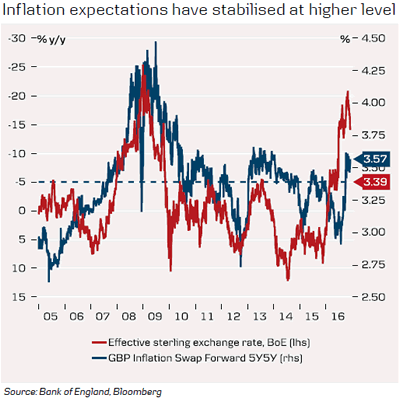In line with our expectations the Bank of England (BoE) made no policy changes at its March meeting and reiterated its neutral stance by repeating it could move ‘in either direction‘.
However, there was a hawkish twist. First, Kristin Forbes (a known hawk) voted for a March hike. Note, though, that she is leaving the BoE on 30 June 2017, which makes her hawkish stance less important. Second, the statement revealed that ‘some members noted that it would take relatively little further upside news…for them to consider that a more immediate reduction in policy support might be warranted’.
We still expect the BoE to remain on hold for the next 12 months. While we think it is unlikely the BoE will tighten monetary policy in a time of elevated political uncertainty, we think we need to see substantially slower growth and/or higher unemployment before easing becomes likely again. Also, BoE Governor Mark Carney has said that one of the reasons the UK has been resilient to Brexit uncertainties so far is due to the significant monetary easing from the BoE.
Note that the BoE reaction function has changed since the financial crisis: BoE puts more weight on growth/unemployment relative to inflation(see also a speech by former Monetary Policy Committee member Martin Wealehere, 18 July 2016). In our view, the BoE seems to be more worried about slower growth than too-high inflation if this is only temporary.
We still see risks skewed on the upside for EUR/GBP
EUR/GBP moved slightly lower and Gilt yields ticked 4bphigher driven by the more hawkish tone in the statement, where Kristin Forbes voted for a 25bp rate hike this time. Note, however, that Forbes is a known hawk and leaves the BoE this summer.
The market is now pricing in an accumulated 8bprate hike from the BoE in 2017 and 26bpby the end of 2018. We still think the market’s pricing is too hawkish, suggesting little support for the GBP driven by higher UK interest rates ahead. Hence, relative rates, in our view, favour lower GBP/USD, as the Fed is slightly underpriced, while risks stemming from relative rates are more balanced for EUR/GBP, as the market has turned too hawkish on the ECB pricing as well, with a 10bp rate hike priced by March 2018.
EUR/GBP has fallen back below our 1-3M target of 0.87. As such, we still see risks skewed on the upside for EUR/GBP, as we expect GBP to underperform vis-à-vis the USD and EUR in coming weeks and following the triggering of Article 50.
However, the Brexit risk premium priced on GBP has increased over the past two to three weeks and, given that investors are very short GBP, according to IMM, further GBP short covering could pave the way for a short-term correction lower in EUR/GBP.
Three main triggers for BoE
The summary of the BoE meeting in March contained three main triggers for changes to the BoE’s current monetary policy stance.
- CPI inflation.
- Wage growth.
- Private consumption.
Higher CPI inflation and/or higher wage growth than currently expected would increase the likelihood of a hike.
Slower private consumption growth than expected would increase the likelihood of a cut.
Too hawkish BoE pricing, in our view
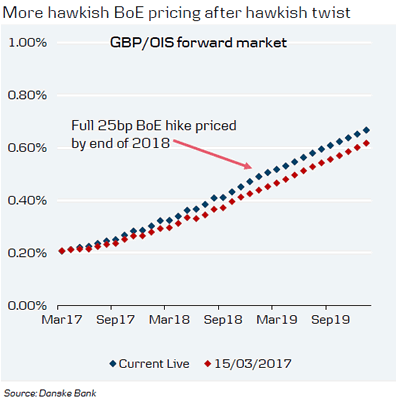
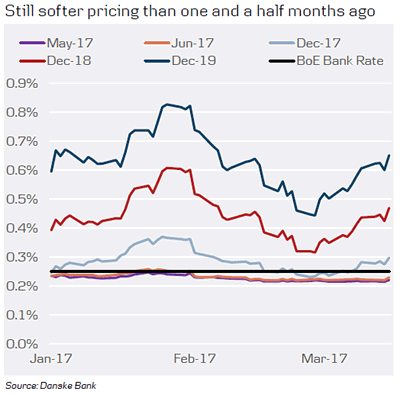
BoE February Projections
BoE expects CPI inflation to move higher from here
In connection with its March meeting, the BoE stated that its ‘February projections remained broadly on track’.
In the latest Inflation Report, the BoE projects CPI inflation will increase significantly from here due to the weaker GBP, which has pushed up import prices.
The BoE expects inflation to peak around 2.8%.
The BoE expects the overshooting of inflation to be temporary, i.e. it expects inflation to fall back to 2% beyond the forecast horizon.
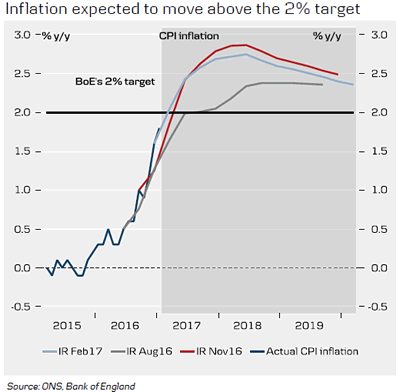
BoE expects GDP growth to slow in coming years to around 1.5%
The BoE now expects GDP growth of 0.6% in Q1 17, which is 0.1pp higher than projected in the February Inflation Report.
We are more pessimistic on GDP growth than the BoE. Note that PMIs suggest that GDP growth has been in the range of 0.3-0.4% in Q1 17 – see page 13.
The BoE projects GDP growth will slow in coming years due to the following.
- Slower private consumption growth.
- Slower business investments.
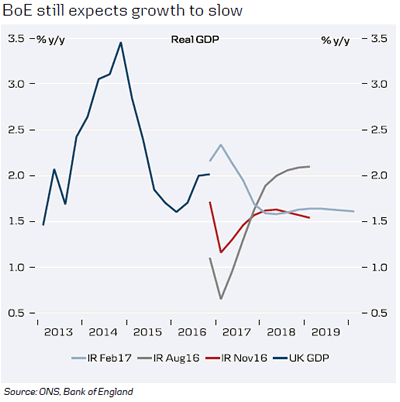
BoE expects unemployment rate to stabilise above NAIRU
At the March meeting, the BoE stated that its ‘February projections remained broadly on track’.
The BoE no longer expects the unemployment rate to rise significantly as in previous inflation reports.
One reason for this is that the BoE has revised down its NAIRU estimate from 5.0% to 4.5%, i.e. there is currently more slack left in the labour market than it estimated previously.
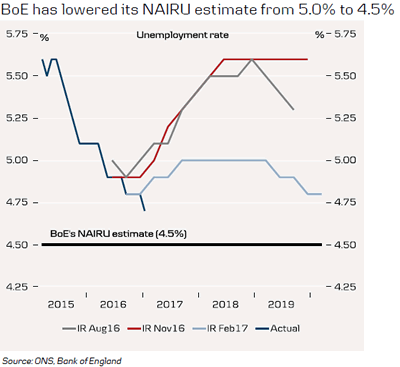
Macro Charts
GDP growth has been resilient to Brexit uncertainties
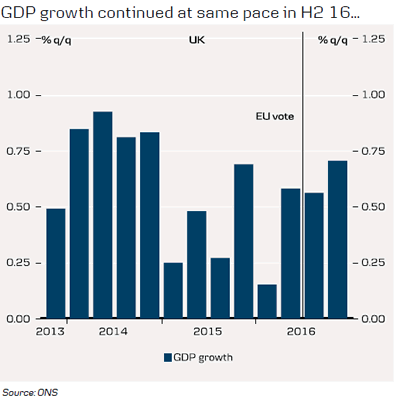
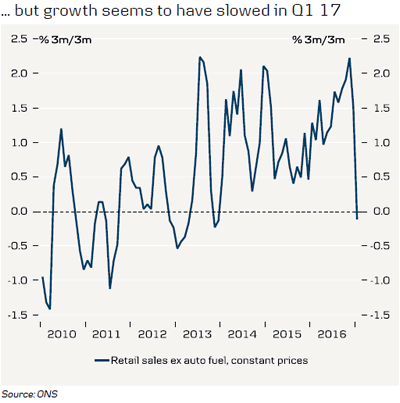
PMIs suggest Q1 GDP growth in the range of 0.3-0.4% q/q
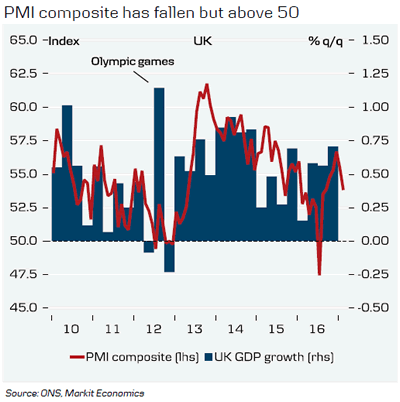
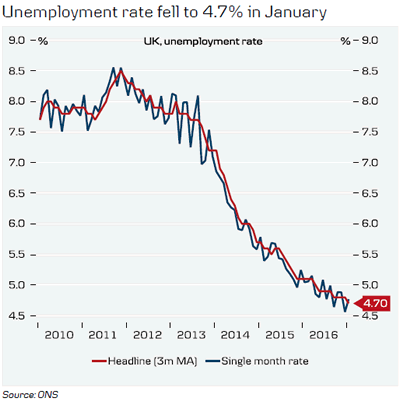
Inflation expected to rise supported by weak GBP
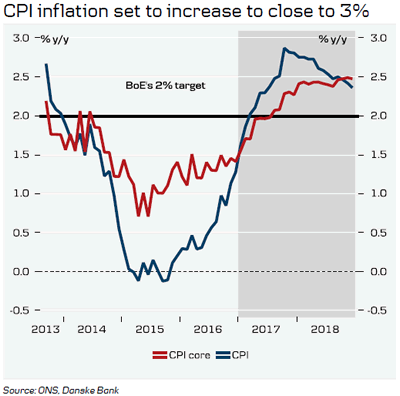
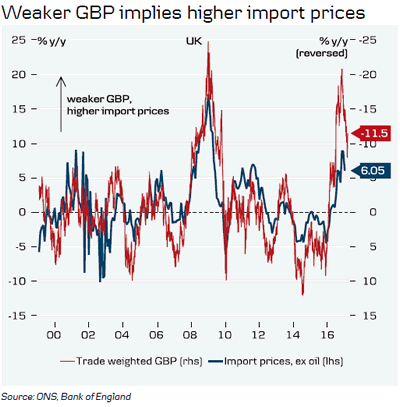
End of food and energy deflation
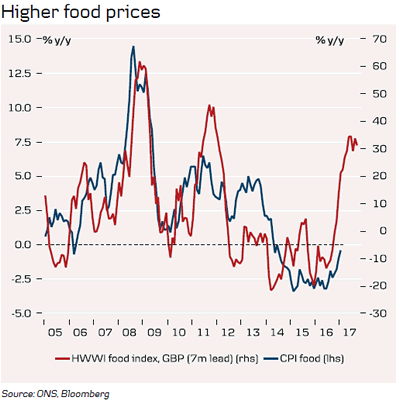
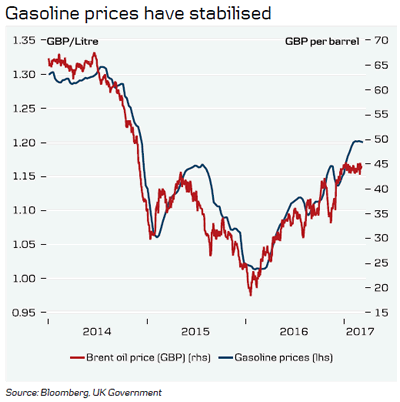
Inflation expectations have rebounded
